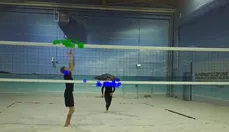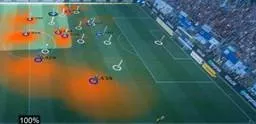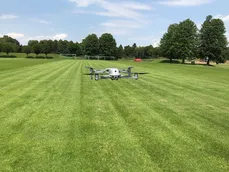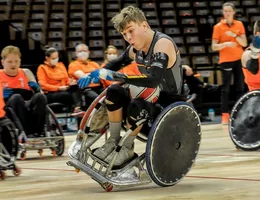Current Projects (Selection)
Currently we are working on these third-party funded projects:
- Advancing spatiotemporal pattern analysis using top-level sports data
- Winning probabilities and their perception in beach volleyball
- Anticipation training in beach volleyball
- Competition analysis in badminton based on keyplays
- Use of drones in sports
- Evaluation of AI generated training plans
- Competition diagnostics in wheelchair rugby
- Performance Analysis Table Tennis
Advancing spatiotemporal pattern analysis using top-level sports data
Contact person: Prof. Dr. Daniel Link
The vast amount of human spatiotemporal movement data hides huge opportunities for various stakeholders and scenarios (e.g., fire evacuation, autonomous vehicles, infrastructure planning, and sports performance analysis). To reveal hidden insights from this data, one can use various state-of-the-art machine learning (ML) approaches. Our focus is to develop and evaluate new approaches for solving typical computational problems, which arise when analyzing huge amounts of spatiotemporal data such as detecting variable-length patterns and finding the right representation models for movement trajectories. As a testing bed, we use sports data, in this case a high-quality dataset from the German soccer Bundesliga. The techniques developed and validated on our high-grade data provide a baseline for further research in all problems with pedestrian trajectory data.
Funding:
MDSI Seed Fund, https://www.mdsi.tum.de/en/mdsi/research/funding-support/seed-funds/
CSC Schoolarship (2x), www.chinesescholarshipcouncil.com
Publications:
Li, Y, & Link, D. (2023). Match Phase Detection in Soccer. 14th International Symposium on Computer Science in Sport 2023, 27.-30.09.2023. Hangzhou, China.
Dick, U., Link, D., & Brefeld, U. (2022). Who Can Receive The Pass? - A Computational Model for Quantifying Availability in Soccer. Data mining and knowledge discovery. doi: 10.1007/s10618-022-00827-2
Lang, S., Wild, R., Isenko, A., & Link, D., (2022). Predicting the in-game status in soccer with machine learning using spatiotemporal player tracking data. Scientific Reports, 12: 16291. doi: 10.1038/s41598-022-19948-1
Winning probabilities and their perception in beach volleyball
Contact person: Steffen Lang
Looking for a direct point win on a serve or would you rather put the ball safely into play? There are many variations in beach volleyball, just when serving. This project examines the question of when game strategies should be adapted during a competition and whether top athletes perceive these moments correctly. When, for example, the serve strategy should be changed and how much risk should be taken has not yet been scientifically proven, meaning that various subjective beliefs have formed on the part of sports practitioners. The two-year project was initiated together with the German Volleyball Federation and is being carried out in collaboration with the Institute of Psychology at the German Sport University Cologne.
Funding:
German Federal Institute for Sport Science (BISp), https://www.bisp-surf.de/Record/PR020240300069
Anticipation training in beach volleyball

Contact person: Fabian Tobias
The aim of this project is to evaluate a training tool to improve the anticipation of defensive players. The tool was developed together with the German Volleyball Association to prepare the German national beach volleyball players for the 2024 Olympic Games in Paris. On the one hand, the correlation between the decision time of the defensive player (relative to the attacker's contact time) and the quality of anticipation (technique and direction of the attacking shot) is examined. Furthermore, the effectiveness of the anticipation tool is examined with regard to the learning effect in the measuring station training. Position-, gender- and age-specific differences will also be examined.
Funding:
German Federal Institute for Sport Science (BISp), https://www.bisp-surf.de/Record/PR020230100022
Analysis of Keyplays in Badminton

Contact person: Fabian Hammes
The aim of this project is to develop and apply a method for analyzing the transitions from balanced to imbalanced states within a badminton rally. In sports science, such situations are referred to as perturbations based on the theory of dynamic systems - sports practice often uses the term keyplays. Artificial intelligence methods are used to identify tactical patterns that trigger such perturbations. On this basis, player strength and weakness profiles can be generated and used as a basis for strategy development. The method will be used to support the German national team at the 2024 Olympic Games in Paris.
Funding:
German Federal Institute for Sport Science (BISp), https://www.bisp-surf.de/Record/PR020201100264, https://www.bisp-surf.de/Record/PR020210801317, https://www.bisp-surf.de/Record/PR020210400484, https://www.bisp-surf.de/Record/PR020240300034, https://www.bisp-surf.de/Record/PR020240300035
Publications:
Hammes, F., & Link, D. (2024). Badminton as a Dynamic System – A New Method for Analyzing Badminton Matches Based on Perturbations. Journal of sports sciences, 42(2), 160-16. doi: 10.1080/02640414.2024.2323327
Hammes, F., Link, D. (2023). Use of Computer Vision to Automatically Predict Starting and Ending Point of a Rally in Badminton. In: Baca, A., Exel, J. (eds) 13th World Congress of Performance Analysis of Sport and 13th International Symposium on Computer Science in Sport. IACSS&ISPAS 2022. Advances in Intelligent Systems and Computing, vol 1448. Springer, Cham. https://doi.org/10.1007/978-3-031-31772-9_11
Use of drones in sports
Contact person: Dr. Tiago Russomanno
The goal of the project, “Use of drones in sports - Position data and video for training and competition”, is to evaluate and validate the use of drone’s videos for position detection in sports for performance analysis. Drones are widely available in the consumer market and have been used for several different applications (e.g., agriculture, surveillance, sports broadcasting), most because they have high-quality video recordings, they are portable and very versatile compared to fixed cameras and offer an aerial perspective of the playing field that are suitable for broadcasting, position detection, and tactical analysis. In this way, we developed a video-based system using drones for performance analysis in different sports (Ultimate Frisbee, Football, and Tennis). Findings showed that the system was reliable for position detection in sports compared to GPS and LPS systems available in the market, providing X and Y position of players in the field with a good accuracy. This technology should help sports teams that do not have access to positional data in a regular basis, improving their performance based on positional data.
Funding:
German Federal Institute for Sport Science (BISp), https://www.bisp-surf.de/Record/PR020191100095
Publications:
Russomanno, T.G., Blauberger, P., Kolbinger, O., Lam, H., Schmid, M., and Lames, M. (2022). Drone-Based Position Detection in Sports—Validation and Applications. Frontiers in Physiology 13. doi: 10.3389/fphys.2022.850512
Evaluation of AI generated Training Plans
Contact person: Prof. Dr. Daniel Link
The automatic generation of training plans is an important feature in modern fitness studios. By automatically adapting the exercises and the training parameters to the current performance level of the trainee, performance and health goals can be better achieved. In this project, a software component for creating training plans is being scientifically evaluated together with EGYM GmbH, Munich. Among other things, the software takes into account the customer's performance level, their training goals and the conditions in the gym. The evaluation is based on a comparison with training plans developed by experts. The latest findings from training science research are also integrated into the algorithm.
Funding:
EGYM Corp., Munich
Competition diagnostics in wheelchair rugby
Contact Person: Max Vater
In cooperation with the German Disabled Sports Association and the German national wheelchair rugby team, the project is developing competition diagnostics based on a computer-assisted sport-specific observation system. The aim is to develop a field-suitable analysis tool that can be used routinely in practice for competition diagnostics in wheelchair rugby. The results obtained confirm the potential of sport-specific observation systems in the form of individually developed software solutions.
Funding:
German Federal Institute for Sport Science (BISp), https://www.bisp-surf.de/Record/PR020210701230
Publications:
Vater, M., Sing, K., Sauerbier, J., & Lames, M. (2023). Leistungsdiagnostische Untersuchungen der deutschen Rollstuhlrugby Nationalmannschaft unter Berücksichtigung der sportartspezifischen Klassifizierung. In J. Süßenbach & S. Schiemann (Eds.), Diversität im Sportspiel (pp. 214-229). Hamburg: Feldhaus Verlag.
Performance Analysis Table Tennis
Contact person: Ruizhi Liu
This research project investigates the intricate dynamics of table tennis by focusing on three key dimensions: match, set, and rally. Innovative statistical approaches—including the Double Moving Average Model, Scoring Relevance Model, and Enhanced First Offensive Shot Model—are employed to integrate theoretical frameworks with practical analysis. The study provides a more comprehensive understanding of performance fluctuations, the strategic importance of scoring, and transitions of the first offensive shot.
Funding:
CSC Schoolarship, www.chinesescholarshipcouncil.com
Publications:
Liu, R., & Lames, M. (2024). Within-Match Performance Fluctuations: Assessment and Observed vs. Expected Extent in Table Tennis. Journal of Human Kinetics, 93



